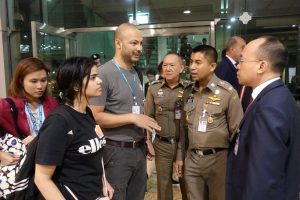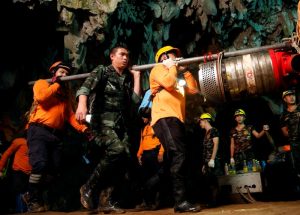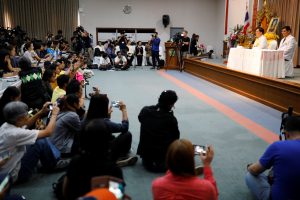
By Patpicha Tanakasempipat and Panu Wongcha-um
BANGKOK (Reuters) – On Sunday morning, a new Twitter account was created by an 18-year-old Saudi woman denied entry into Thailand as she fled from what she said was an abusive family.
The first message from Rahaf Mohammed al-Qunun, in Arabic, was at 3:20 a.m. Thai time (2020 GMT Saturday) and posted from the transit area of Bangkok’s Suvarnabhumi airport. It said: “I am the girl who escaped Kuwait to Thailand. My life is in real danger if I am forced to return to Saudi Arabia.”
Within hours, a campaign sprung up on Twitter dubbed #SaveRahaf. Spread by a loose network of activists around the world, within 36 hours it prompted Thailand’s government to reverse a decision to force the young woman onto a plane that would return her to her family.
Qunun was allowed to enter Thailand and on Tuesday was beginning the process of seeking asylum in a third country through the U.N. refugee agency.
“Everybody was watching. When social media works, this is what happens,” said Phil Robertson, deputy Asia director for Human Rights Watch, of the international outcry.
Qunun’s family could not be reached to respond to her allegations of abuse. Reuters could not directly contact Qunun, but spoke to several confidants who described how the dramatic campaign unfolded across the world.
After her initial Tweet, Qunun posted nearly non-stop for five hours, saying she had been abused and threatened by her family.
Halfway around the world, retweets by Saudi Twitter users were noticed by Egyptian-American activist Mona Eltahawy in Montreal who began translating and retweeting Qunun’s Arabic tweets at 4 a.m. Thailand time, even though she was initially unsure if the account was authentic.
“(I was) doing my best to get attention to her because I could not live with myself if she was real and I ignored it,” Eltahawy told Reuters in an e-mail.
BANGKOK, MONTREAL, SYDNEY
About two hours later – 6 a.m. Sunday morning in Thailand but mid-afternoon in Australia – a Sydney-based video journalist noticed and retweeted Eltahawy’s translated messages.
The journalist, Sophie McNeill of Australia Broadcast Corp., began tweeting back to Qunun, and later the two began privately corresponding by direct message.
At 11 a.m. on Sunday in Thailand – eight hours after Qunun began tweeting – Human Rights Watch’s Robertson, who is based in Bangkok, also began tweeting about the case.
He also contacted Qunun directly and she replied.
“She said very clearly that she has suffered both physical and psychological abuse. She said she has made a decision to renounce Islam. And I knew once she said that, she is in serious trouble,” Robertson told Reuters.
Renouncing Islam is a crime punishable by death under the Saudi system of sharia, or Islamic law, though the punishment has not been carried out in recent memory.
By early Sunday afternoon, Robertson had notified the U.N. refugee agency in Thailand and several foreign embassies about the unfolding case, and they began to contact Thai authorities.
BARRICADED DOOR
At around the same time, journalist McNeill decided to fly to Thailand and try to meet Qunun.
“I’d never spoken to her before,” she told Reuters. “For me, it was so important that this was documented, and I wanted to be there and witness it.”
While McNeill boarded a flight from Sydney to Bangkok, Qunun was holed up in an airport transit hotel and afraid she would be forced onto the next flight back to Kuwait. She continued tweeting and also corresponding with Robertson of Human Rights Watch.
At around 5 p.m. Sunday, she was taken out of her room by Thai officials but later allowed to return.
“She filmed these two people talking to her,” said Robertson. “They said to her very clearly that they will put her on the Kuwait Airways flight KU 412 leaving (Monday) at 11:15 a.m.”
By this time, global media outlets had picked up on the story and Thai immigration officials were confirming that Qunun was to be expelled on Monday morning.
At about 1 a.m. Monday morning, Qunun posted a video of herself pushing a table to barricade her hotel room door.

Saudi teen Rahaf Mohammed al-Qunun is seen with Thai immigration authorities at a hotel inside Suvarnabhumi Airport in Bangkok, Thailand January 7, 2019. Thailand Immigration Police via REUTERS
THREATENING LANGUAGE
McNeill arrived in Thailand early on Monday and managed to join Qunun in her hotel room.
“When it became clear that she wasn’t going to leave, I decided it was important to stay and have someone documenting what was going on,” McNeill said.
Qunun refused to open the door when various officials came to escort her to the Kuwait Airways flight.
“We were inside the room and there were numerous people coming to the door … There were several Arabic speakers who came and were using threatening language to try and force her back on the plane,” McNeill recalled.
The flight to Kuwait City left without Qunun.
At 3:30 p.m. on Monday, Thailand’s immigration chief Surachate Hakparn held a press conference at the airport for dozens of Thai and international media representatives gathered in the transit area.
After a day of insisting that Qunun must be sent back under Thai law, Surachate said she would not be immediately be expelled since she could be in danger and he would meet U.N. officials to discuss her case.
United Nations High Commissioner for Refugees (UNHCR) country representative Giuseppe de Vincentiis arrived at the airport at about 5 p.m. on Monday to meet Thai officials and Qunun herself.
By about 7:30 p.m on Monday, Surachate told reporters Qunun would be allowed to enter Thailand and apply for asylum in a third country.
The UNHCR said on Tuesday that it would take time to process Qunun’s application, and its officials continued to interview her at an undisclosed location.
Saudi Arabia on Tuesday denied on its Twitter account that its embassy in Thailand had asked for Qunun to be extradited, although Surachate had said the previous day the embassy had been in contact with Thai immigration before her arrival from Kuwait.
The Saudi embassy in Bangkok declined to comment on Qunun’s case when contacted by Reuters on Monday and could not be reached on Tuesday.
But on Tuesday, the Thai immigration office released a video clip of its officials meeting Saudi diplomats to discuss the case.
“When she first arrived in Thailand, she opened a new site (account) and the followers reached about 45,000 within one day,” a Saudi official speaking in Arabic through a translator tells Thai officials in the video.
“I wish you had taken her phone, it would have been better than (taking) her passport,” the official said.
(Additional reporting by Stephen Kalin in Riyadh, Editing by Raju Gopalakrishnan)
















